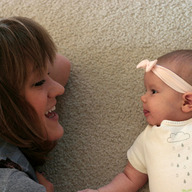english
You are viewing stuff tagged with english.
You are viewing stuff tagged with english.
Well if this isn’t just the most perfect paragraph:
I reserve the right to make up a word if I can’t fromate one that suits the immediate need of a sentence. This is where heroes step in and fix the inadequacies of the English Language.
If you ask Ess to say “snake” she’ll say “tank”. She usually drops the sibilant “S” sound at the beginning of words; if we really try to get her to say it, she’ll go with the “sh” phoneme.
If you ask her to say “Sammy the Snake” you get “Hammy the Tank”.
Ess likes to watch a movie called Curious George Swings into Spring, but she asks for it by saying something like “watch… maow… ping… and balloons UP and UP” or some other kind of variation on her summary of the plot. To translate: her stuffed monkey’s name is Marge, nicknamed Mow, so monkeys get called Mows; there are hot air balloons in the movie in many shapes, and sometimes we have only the barest hint of a guess which movie she’s referring to. There’s also ‘Crinkas Pooh’ (Christmas Pooh), ‘Pump pump Mow’ (Curious George: A Halloween Boo Fest), and ‘Ringinal Pooh’ (The Many Adventures of Winnie the Pooh, which we sometimes call Original Pooh).
Ess-to-English translator, October, 2016 edition:
pump-pump — pumpkin
keem — diaper cream
carefiff — carrot
hot-dong — carefiff dogs made by Mykala by marinating carrots, served on a bun; (they are DELICIOUS)
Ess just called cotton “unk-unk”.
“Dada, hi!” and then a pause. “Dada… hi.” Essie had just turned to see what I was doing at the edge of the bedroom, and while she has been uttering expressive morphemes in response to me and my actions for a while, her greeting marked one of her first definite sentences at me. The thrill! Burbles and gurgles of infancy have so quickly become expressions of thought and opinion and frustration and love.
If Essie doesn’t know or can’t say the word for something, it is always always ‘dahVEE’. “Can you say ‘refrigerator’?” we ask. Then, with utter confidence comes the response: dahVEE. “What’s that?” we query, pointing to something new. It’s a dahVEE. Obviously.
A few entries in the English to Essie dictionary:
Scoop: bey-doup
Dante the Dragon: bee-lah
Pine nut: ma-guck
Ess demonstrates the last one for us in this video. The middle one is because the dragon chases Ess and says “blah” at her. I’m starting to understand why parents have such an easy time understanding their kids.

This has been making the rounds today, and I don’t usually post something just to link to it (anymore), so you will understand that this is for future reference. Semicolons; So Tricky by Mary Norris at the New Yorker, quotes from a book called “Punctuation..?”:
Despite its ungainly title, “Saussure, Predictive Text, Cycling Awake and the word ‘Book’” is an interesting article. Here’s the thesis: two unrelated books on your bookshelf can become associated in your memory, simply because they are next to one another. Similarly, two unrelated words on your phone can become associated in your memory, simply because T9 predictive text puts them next to one another. As a result, language grows in richness, because new associations are made on the bookshelves of our phones. It’s a really neat idea, one that has produced real-world results. For example, the word “Zonino” is “text misprediction” for “WooHoo!”
When I’m a parent, I want to use old-fashioned words. If I want everyone to quit fighting, I’ll say “Kids, stop your quarreling!”
If I think we should all sit out on the porch after dinner: “Let’s retire to the colonnade.”
Someone’s hair is getting a little long: “Your tresses need to be shorn.”
My sister (who just got her PhD in applied mathematics) Katy sent me a great article about a talking, learning 5-year-old intelligence research parrot named Alex (parrot) - Wikipedia:
He called an apple a “banerry”, which Pepperberg thought to be a combination of “banana” and “cherry”, two fruits he was more familiar with.
Implicature is when you suggest an idea by what you say, but your words don’t have to be taken that way. And, well, I guess there’s a whole field of linguistics where people structure how we talk with one another into ordered rules. For example, Gricean maxims deal with assumptions about your conversational partner: that their contributions are relevant, clear, true, and that they aren’t too long-winded in responses. However, the rules still work when we choose to break (flout) them:
That I’ve made it 25 years without hearing about the Hegelian dialectic is… I’m lame.
Hegelian dialectic, usually presented in a three-fold manner, was stated by Heinrich Moritz Chalybäus as comprising three dialectical stages of development: a thesis, giving rise to its reaction, an antithesis, which contradicts or negates the thesis, and the tension between the two being resolved by means of a synthesis.
Continuing the “words whose sounds and/or connotations I hate” series with this gem of an entry: “foodie”. Hate that word.
Any words you guys hate?
Words (phases) I really really hate for reasons not worth elaborating:
The high rising terminal (HRT), also known as uptalk, upspeak or high rising intonation (HRI), is a feature of some accents of English where statements have a rising intonation pattern in the final syllable or syllables of the utterance.
The Dumbest Generation: How the Digital Age Stupefies Young Americans and Jeopardizes Our Future… I wish I had time to read this book (oh, the irony) by Emory University English professor Mark Bauerlein. Reviewer David Pitt summarizes the central thesis of Bauerlein’s book (emphasis mine):
Wikipedia has a List of English words of Yiddish origin. Quite useful, as these words are use far more often than you’d think. I think I’ll adopt nosh, a noun or verb meaning “snack”.
↓ More